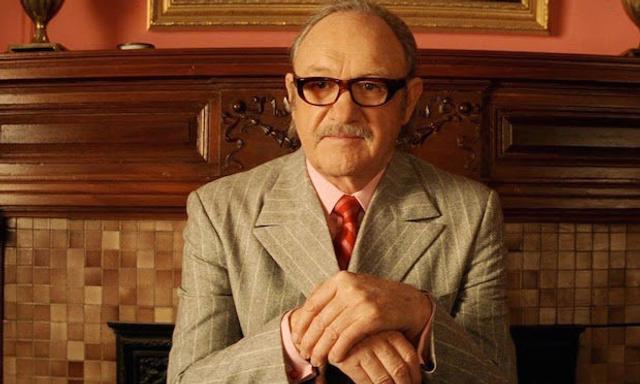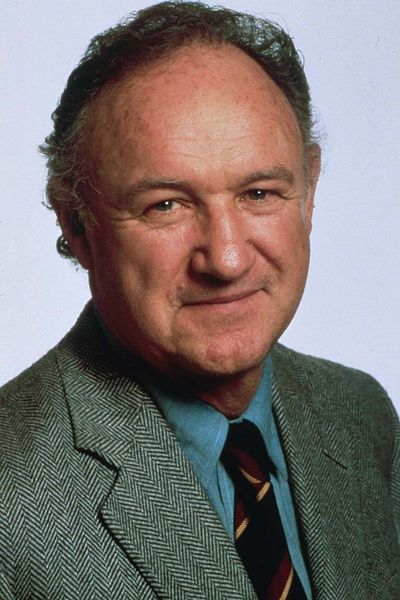Gene Hackman is one of those actors that has almost always maintained a slightly haggard, middle-aged appearance throughout his career.
Unlike his peers - Robert Redford, Dustin Hoffman, Clint Eastwood et al - Hackman always looked like the world had worn him down and made him tougher, more gritted and more angry. Indeed, some of his most defining roles have played on this perception, when the reality is that Hackman off-screen is a deeply private and articulate man who's forged a second career as a novelist.
The funny thing is that early in Hackman's career, he was voted Least Likely To Succeed in his Alma Mater, the Pasadena Playhouse. As a struggling actor working a doorman job in New York, Hackman is said to have seen one of his instructors, saying that Hackman "wouldn't amount to anything." The meeting pushed Hackman on, and within a few short years, Hackman had his first Academy Award nomination in 1967 for the violent crime biopic, Bonnie & Clyde. Before this, he had worked on many light comedies in theatre and on Broadway, often working with improvisational groups to hone his ability to be more natural and quick-thinking.
After his first Oscar nomination, Hackman was eager for work and almost accepted a role on a TV series that would later become The Brady Bunch, however his agent advised against it. Before long, Hackman was taking home his first Oscar for playing the unhinged, relentless New York detective Popeye Doyle in William Friedkin's starkly realistic crime drama The French Connection. Other actors were offered the role before Hackman, notably Steve McQueen - off the back of Bullitt - and Lee Marvin, who was primarily known for his work in Westerns. Paul Newman was even considered, but considered to be way too expensive for the role. Hackman - then a relative unknown - embodied the role completely, but Friedkin later remarked that the actor cringed when asked to go through some of the racist dialogue in the script.
.gif)
After the success of The French Connection, Hackman starred in a number of slightly less commercial films, including 1972's The Poseidon Adventure and Francis Ford Coppola's paranoia thriller The Conversation, for which he received a Golden Globe nomination. As well as this, Hackman starred in one of his comedic roles as Harold in Mel Brooks' Young Frankenstein, opposite Gene Wilder and Peter Boyle. He also had a role in Richard Attenborough's 1977 war epic, A Bridge Too Far, and reprised the role of Popeye Doyle in John Frankenheimer's less-successful sequel to The French Connection. By the end of the '70s, Hackman was one of the most recognisable actors in the world and commanded a $2 million paycheque for Richard Donner's Superman. In an interview with Wogan in 1986, Hackman said that playing Lex Luthor was like "a licence to steal", but remarked that he took time off after playing the character as he felt his work wasn't up to scratch.
His work throughout the '80s was marked by commercially successful films one year, and more thought-provoking and less accessible films. In the same year he starred in acclaimed sports drama Hoosiers, which is often considered one of the greatest sports films ever made, he also starred in Sidney Lumet's political drama Power. Two years later, Hackman would star alongside Willem Dafoe in the highly controversial Mississippi Burning, in which Hackman played an FBI agent sent to investigate the disappearance of three men involved in voter registration.
1992 saw Hackman pick up his second Oscar for Clint Eastwood's Unforgiven, wherein he played 'Little' Bill Daggett. Hackman was again playing a ruthless, violent character that terrorised a small town under the guise of law enforcement. Hackman himself didn't even expect to win any awards for the role. When he won the Golden Globe for his performance, Hackman said that he "just lost a hundred bucks" betting against himself. This humility played a huge part in many of his roles, and Hackman often said that he became a star, he'd lose contact with "the normal guys I play best."
By 2000, Hackman's workload was slimming down and he himself was becoming less and less interested in his acting work. Of the nine films he starred in between 2000 and 2004, five of them were comedies - The Royal Tennenbaums, The Replacements, Welcome To Mooseport, The Mexican and Heartbreakers. Only Wes Anderson's The Royal Tennenbaums was of any real note, but it showed that Hackman was more eager to take on comedy roles than he had been in his career up to this point.
In one interview, Hackman said that "(it) really costs me a lot emotionally to watch myself on-screen. I think of myself, and feel like I'm quite young, and then I look at this old man with the baggy chins and the tired eyes and the receding hairline and all that." One of his last public interviews was in 2011, in which Hackman talked openly about his career and why he chose to retire. "I miss the actual acting part of it, as it's what I did for almost fifty years, and I really loved that. But the business for me is very stressful. The compromises that you have to make in films are just part of the beast, and it had gotten to a point where I just didn't feel like I wanted to do it anymore."
Many people find it odd that his final acting role to date was 2004's Welcome To Mooseport, starring alongside Ray Romano. Hackman played a former US President who's retired to a quiet, sleepy town and begins to butt heads with a local man. Hackman's character was a hugely successful politician who's lost touch with the common man and only enters into a mayoral race to stop his house being divided in a divorce settlement. Hackman previously remarked that he began his career in light comedies, so it seems somewhat fitting that his career ended on a similar note. The film was, sadly, panned by critics and currently sits at 13% on Rotten Tomatoes. Since his retirement - such as it is - Hackman has penned four fiction novels.
Over his career, it's clear that Hackman's work has been varied, both in terms of critical acclaim and the roles themselves, but that he himself remained the same as ever.




















































































